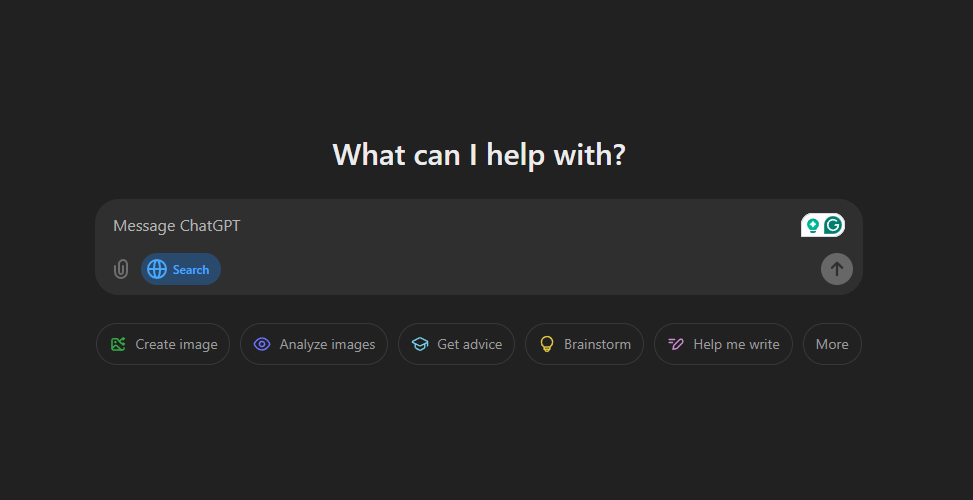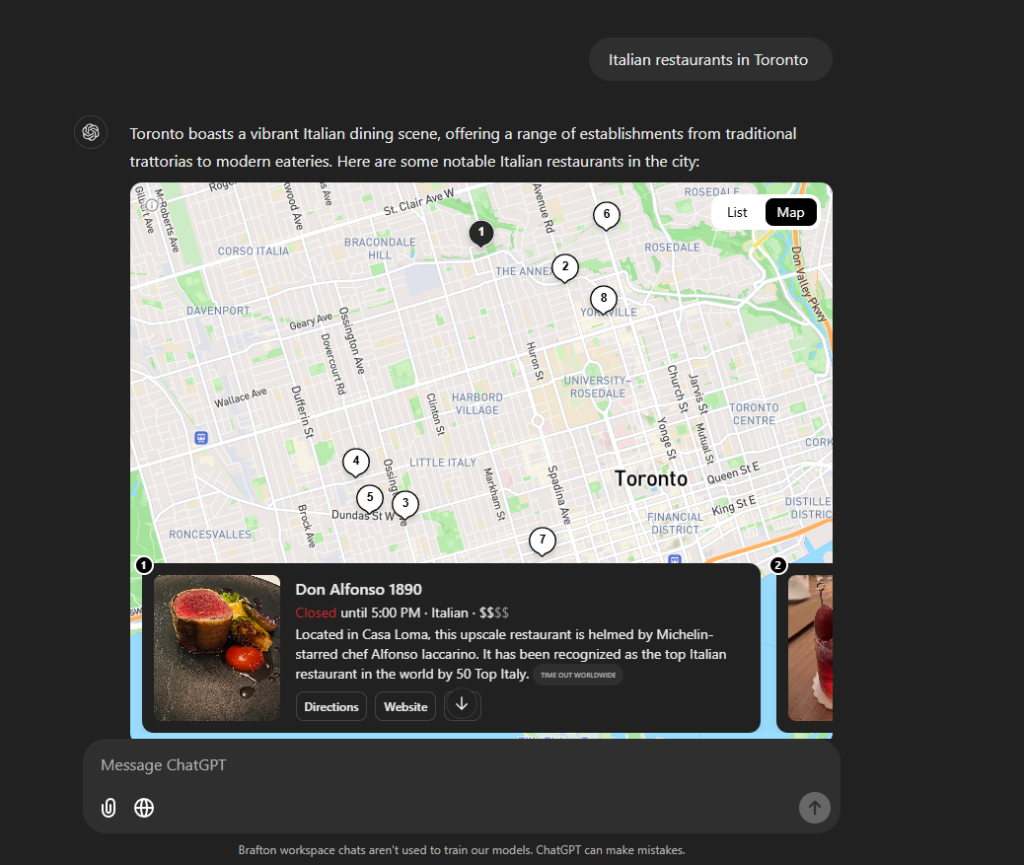Move over Google, there’s a new search-iff in town. Terrible wordplay. Just terrible.
But it’s true! At the end of October 2024, the folks over at OpenAI announced their brand-new feature for ChatGPT, intuitively called ChatGPT search. With claims of delivering fast and timely answers to even your most involved questions — plus links to relevant web sources to back them up — it’s a lot to take in.
So, let’s see what this new feature offers, how it works, whether it’s worth adding to your search tool belt and what people are saying about it.
A New Way To Search
If you’re familiar with ChatGPT, you already know what the interface looks like:
What can I help with?
(Message ChatGPT)
Something like that. Welcomingly, the new search feature is built directly into the existing interface in a subtle and non-intrusive way instead of being a totally separate thing. There’s simply a little globe icon inside the text box, just below where you type, that represents the entirety of the new feature.
Click on it before you enter your query and it turns blue with the text ‘Search’ next to it. Like this:

Once you activate the new feature, you can carry on as usual with your query. As it’s generating a response, you’ll notice that it says “Searching the web…” before it delivers results. Alternatively, you can forego manually clicking on the search icon and, if ChatGPT suspects your query calls for real-time results, it will automatically search the web.
Once it’s finished, it looks something like this:

Notice the bubbles under each result that tell you where the information came from. Hover over them to see a quick snapshot of the source, like the heading of the page and the publish date. Click on it and it opens a new window directly to the website.
Depending on what you search for, the interface can look a little different and, frankly, cooler. For example, when searching for restaurant recommendations in a major city, it provides a fully interactive map:

Google and Microsoft have had this type of search functionality integrated into their AI systems for a while with Gemini and Copilot respectively. With ChatGPT search, OpenAI hopes to catch up — while doing it better than its competitors.
This seems like a great idea in theory and like it could certainly be helpful in many ways, but does it always work as advertised? Does it have what it takes to compete with the likes of Google in the search market?
What’s the Consensus On ChatGPT’s New Search Feature?
While it’s difficult to know how the general public and avid users of ChatGPT feel about the new search feature given how new it is, there has been some backlash.
In an article on The Verge, whose parent company happens to have a partnership with OpenAI, it says that while media partners will “get more control over how their content surfaces in ChatGPT, they won’t be automatically given a higher priority in queries.”
Subscribe to
The Content Marketer
Get weekly insights, advice and opinions about all things digital marketing.
Thank you for subscribing to The Content Marketer!
However, in an opinion article on Poynter by MediaWise director Alex Mahadevan, he reports that metro newspapers are underrepresented in ChatGPT search when looking for local news. Instead, the engine seems to favor larger national outlets — especially those that have partnerships with OpenAI.
“The three national outlets in my first search are owned by companies that have signed deals with OpenAI,” Mahadevan said. He also notes that a couple of those metro outlets he’d like to see represented in search results for local queries are currently suing OpenAI — the Orlando Sentinel and South Florida Sun-Sentinel.
Mahadevan also reports that one search even went so far as to return the following phrase: “Due to ongoing legal proceedings between OpenAI and the South Florida Sun-Sentinel, I am unable to provide direct excerpts from their articles.” Further still, he found that only 32 results out of 100 total searches came from non-partnered newsrooms.
So, that’s a bit concerning. We all know that there’s no room for bias in generative AI content, which is why it’s so important to double- and triple-check your results. The problem is, for a tool that touts speed as a major selling point, it kind of negates the whole purpose of it in the first place.
With all of that in mind, it’s important to look at all sides of the coin — and a lot of folks are loving this new integrated search functionality from OpenAI.
In a recent Tom’s Guide article called “I just tested Google vs ChatGPT search — and I’m shocked by the results,” AI Writer Amanda Caswell shows how she believes ChatGPT search sweeps up its competition in every single category, including:
- Speed and response time.
- Quality of information and accuracy.
- Real-time updates.
- Overall user experience and accessibility.
- News stories in real-time.
- Sports news and updates.
These are two fairly opposite opinions on the tool — but what should you make of it?
Take ChatGPT Search for What It Is
I believe two things can be true at once. While favoring large national partners over other media outlets that probably make more sense to source is certainly a problem, it’s clear that ChatGPT search is pretty good at what it does — especially since it was only just released.
So, I think it’s safe to say that, if you decide to try this tool out for yourself, take it for exactly what it is: A brand-new feature that’s bound to have a few kinks but is pretty good at basic inquiries where bias wouldn’t necessarily be an issue — like looking for shop recs in a new city.
What Are the Implications of This Tech if It Truly Takes Off?
But wait! There’s something interesting to uncover here when it comes to search engine optimization. While ChatGPT search is built on a variety of search technologies according to Adam Fry, the person heading up the search feature, one of the foremost is Microsoft’s Bing. ChatGPT search uses Bing’s index to serve content to users.
For a landscape dominated by Google, which is where a majority of marketers and SEO professionals focus their efforts, what does this mean for the future of search if this thing really takes to the air?
Well, it means that SEO professionals around the world should start paying a bit more attention to Bing when devising their strategies and campaigns.
Reddit user “malangkan” in r/SEO offers an opinion on how they think things will unfold.
“It’s [ChatGPT search] definitely gonna change web search big time. While it may be a source of traffic, I think CTR [click-through rate] will be significantly lower than in Google SERPs (because the answers are provided by the AI and many people will be satisfied with it thus not click for further information).”
Others say the tech will take time to evolve, while some remark that “SEO is about to get more technical.”
If ChatGPT rises to a comparable level to Google, search will certainly change — but it’s hard to say exactly how at this point. Will it warrant a complete dismantling and rebuilding of your current SEO strategy? Or, will it simply call for smaller tweaks and refinements? Only time will tell.
Searching for an Answer to Traditional Engine Woes
Here’s a recap of some of the most important takeaways about ChatGPT search so far:
- It may have some publisher bias.
- It works well for what it is — even better than Google according to some.
- It uses Bing’s index to serve results.
Given that it’s only just come out, there’s no doubt that it will change over time as OpenAI continues to update its algorithms and whatnot. How, exactly? It’s tough to say. For now, try it out for yourself if you haven’t already; experiment with it. That’s the best way to form your own opinion. Happy tinkering!







